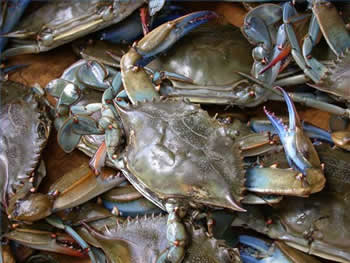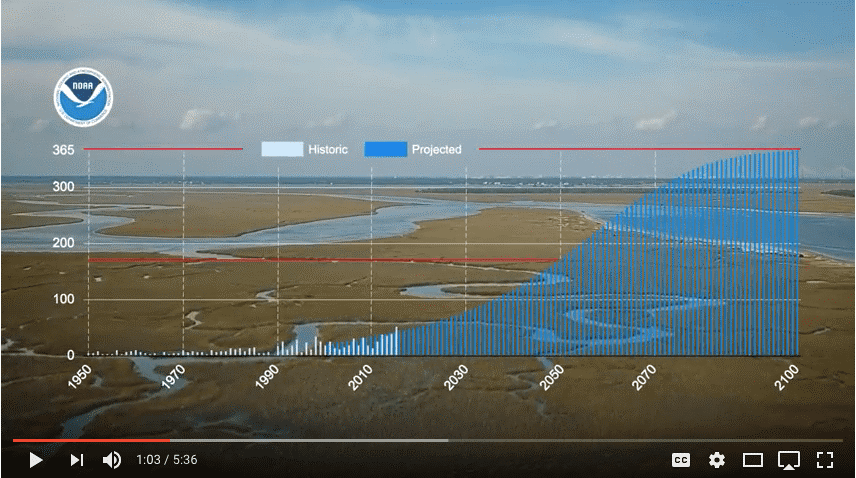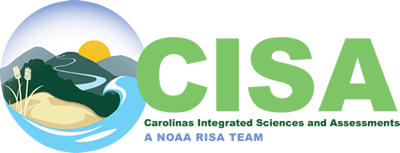Decision Support Services

Extending beyond stakeholder-driven climate research, CISA team members work to translate findings into useful, useable information for decision makers. This entails engagement with stakeholders from project development through final dissemination of findings in order that questions are answered in a way that is most relevant to the end user.
Connecting Climate with Public Health in the Carolinas
CISA team members at UNC Chapel Hill and the Southeast Regional Climate Center are working with stakeholders to provide even more decision-relevant information about the connections between climate and health through the Convergence web portal. Convergence provides links to research findings, information on climate extremes in the Carolinas and the populations most vulnerable to their impacts. It also houses tools like HERA (Hazardous Extremes for Risk Assessments), which summarizes meteorological data for public health and hazards planning. This unique collaboration integrates research and community action to empower communities in their work to improve citizens’ lives.
CISA Collaborators
Chip Konrad
Montana Eck
Project Partners
- NC Division of Public Health Climate and Health Program
- Southeast Regional Climate Center
- UNC Chapel Hill Research Hub at Davis Libraries
Focus Area
Climate & Health
Coastal Carolinas Climate Outreach Initiative
In partnership with the SC Sea Grant Consortium, CISA funds a coastal climate extension specialist who unites the expertise of CISA research on climate science with the outreach expertise of regional Sea Grant extension programs. Sarah Watson currently holds the position and is based out of the SC Sea Grant Consortium offices in Charleston, SC.
Sarah cultivates relationships with many stakeholder groups, including coastal zone management, local municipalities, and local non-government organizations in order to bridge the gap between coastal climate science and decision making. Sarah serves as a liaison to multiple communities in the coastal zone. For example, she is working with local leaders in Beaufort County to turn their 2015 Sea Level Rise Adaptation Report recommendations into community ordinances and incorporate them into the municipality’s comprehensive planning process.
Sarah also works closely with climate extension specialists from other Sea Grant programs throughout the Southeast to further extend the reach of these efforts.

CISA Collaborator
Sarah Watson
Project Partner
- SC Sea Grant Consortium
Focus Area
Coastal Climate
Tailoring Climate Information for Decision Maker Needs
CISA works with stakeholders and decision makers to produce tailored climate information materials customized to their specific information needs in order to make climate information useful and accessible.
• Innovating Drought Communications with North Carolina Decision Makers
This project, led by the State Climate Office of North Carolina (SCONC) with support from CISA, developed sector-specific information for drought decisions, delivering accessible and actionable information, and improving the transparency of the drought monitoring process. Dubbed Project Nighthawk after the common nighthawk (Chordeiles minor), a drought-resilient bird species native to NC, the project is designed as an iterative process that engages decision makers from multiple stakeholder groups. Drawing from the lessons learned in the project, the SC State Climatology Office is now providing similar drought communications to its stakeholders. Stakeholders report using the communications documents:
- to help water utilities explain water withdrawal restrictions during drought to their constituents.
- to inform timing of herbicide, insecticide, and fungicide applications by the agriculture sector.
- to help forest resource managers make decisions about burn bans during dry periods.
- to help cooperative extension agents understand what conditions are like in areas they aren’t able to visit in-person due to the coronavirus pandemic.
CISA Collaborators
Kirsten Lackstrom
Project Partner
- State Climate Office of North Carolina
Focus Area
Water Resources
Coastal Salinity Index
The Coastal Salinity Index (CSI) was developed as a way to characterize coastal drought by monitoring the freshwater-saltwater interface. The tool is intended to improve understanding of the effects of changing salinities on fresh and saltwater ecosystems, fish habitat, and freshwater availability for municipal and industrial use. In collaboration with partners from the USGS South Atlantic Water Science Center, CISA is engaging with decision makers to pilot the CSI’s use and applications.
Read more about the Coastal Salinity Index and related research
CISA Collaborators
Kirsten Lackstrom
Lauren Rouen
Dan Tufford
Project Partners
- East Carolina University
- USGS South Atlantic Water Science Center
Focus Area
Coastal Climate; Water Resources
Support for South Carolina’s Drought Response Program
CISA and the South Carolina State Climatology Office (SC SCO) initiated this project in 2017 with the overarching goal of enhancing the State’s Drought Response Program and improving drought preparedness and response. Major components of this project have included two statewide drought tabletop exercises and developing informational resources for the new scdrought.com website.
Read more about the CISA and SC SCO drought response project
CISA Collaborators
Ekaterina Altman
Amanda Farris
Kirsten Lackstrom
Project Partners
- South Carolina State Climatology Office
Focus Area
Water Resources
Citizen Science-Condition Monitoring Project
This project engaged with citizen scientists and the Community Collaborative Rain, Hail, and Snow (CoCoRaHS) Network to promote drought impacts reporting. Observers provide weekly “condition monitoring” reports to document effects of weather and climate on their communities. This project addressed a need identified by stakeholders for improved understanding of drought impacts and for tools to facilitate the use of impacts information into decision making.
Read more about the Condition Monitoring project.
Access the Condition Monitoring Web Map.
CISA Collaborators
Ellie Davis
Amanda Farris
Kirsten Lackstrom
Project Partners
- CoCoRaHS
- National Drought Mitigation Center
- State Climate Office of North Carolina
Focus Area
Water Resources
The Carolinas Precipitation Patterns & Probabilities Atlas
The Carolinas Precipitation Patterns & Probabilities Atlas (Atlas) provides Carolinas-focused information about extremes (drought, heavy rainfall) and normal precipitation patterns. The Atlas includes over 1,000 downloadable maps and figures characterizing various measures of precipitation and drought. It offers information not readily available from other sources, such as frequency and duration of both dry and wet events, and photographs, videos, graphics, and narratives of the impacts of notable drought and heavy precipitation events in the Carolinas
CISA Collaborators
Greg Carbone
Karen Beidel
Junyu Lu
Chip Konrad
Project Partner
- Southeast Regional Climate Center
Focus Area
Water Resources
